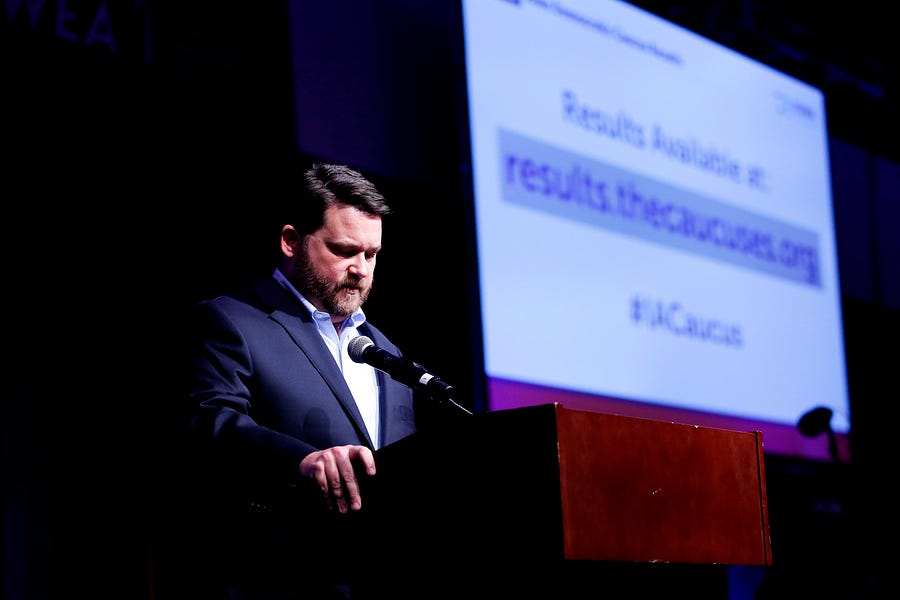One of my favorite running jokes on the internet is, “You had one job.” It’s a staple of Twitter and YouTube, with images of signs reading, “Turn Left” with an arrow pointing right, or supermarket shelves demarcating where you can buy “Poop Tarts.”
Well, the Iowa Democratic Party rolled out a new line of Poop Tarts this week.
The Iowa Democratic Party may have other responsibilities in non-presidential election years, but it’s only important function every four years is to run the Iowa caucuses. It’s the only time the eyes of the nation are on it, and the eyes of the nation this week saw a screwup of biblical proportions. It was like watching a team put screen doors on a submarine and confidently take it out to sea, even though they’d been warned from the beginning that screen doors are a bad idea.
There’s no point in dwelling on the full scope of the failure—they used a faulty app to count votes that they were told in advance was faulty—and then had to manually recheck the votes. It took longer to recheck than it would have taken if they had used technology that was readily available in the 16th century.
And rather than just wait until they had a final tally, they released the tabulations piecemeal, making it possible for different candidates to claim victory based on partial results. Worse, they even got the recheck numbers wrong at one point and had to issue corrections.
It was like a surgeon who accidentally leaves a sponge in a patient’s abdomen and then, in an effort to remedy the situation, takes too long going back in only to remove a kidney by mistake.
Why did it happen? One answer is that the Iowa Democratic Party forgot it had one job—to run the caucuses in a straightforward, transparent and professional manner.
But there’s a larger context. One of the reasons our politics have become so dysfunctional is that the political parties have, over the last 40 years, systematically dismantled themselves, or to be more fair, cooperated with the politicians, activists and journalists who sought to dismantle them.
Subscribing to a misplaced fetishization of democracy in all things, they completely outsourced the responsibility of choosing their candidates to the parties’ most passionate voters—something virtually no other advanced democracy has done. All in the name of reform, they acquiesced to rules and laws that took power away from the parties and put it in the hands of outside groups, donors, the media and, again, primary voters.
They embraced the cultural mantra “Who are we to judge?” and turned the parties into a “vehicle that anyone can drive” in the words of Amy Walter of the Cook Political Report.
The new rules that Iowa enacted for 2020 were forced upon it by Sen. Bernie Sanders, a man who proudly insists he’s not a Democrat, save for purposes of running for president. Those rules were so arcane and ridiculous that a state party infrastructure that knew how to do only one thing couldn’t cope with the demand to do something else.
The ongoing transformation of the GOP into a proudly nationalist and protectionist party in the image of Donald Trump is merely another facet of the same problem. Parties always cared about winning the next election; that’s one reason they exist. But it’s not the only reason they exist. They are also institutions that stand for certain ideas and interests that are more enduring than the just the next election. Or at least they used to be.
That meant they understood the need to police their own, to enforce compliance with certain policies and certain norms that contributed to the long-term health of the institution. Now, partisanship has been outsourced to the angriest voices and the media outlets who make money from them, leaving the parties as brands that can’t tell their customers anything they don’t want to hear.
When Richard Nixon resigned in disgrace, it wasn’t because he wanted to, but because the Republican Party essentially told him he had to go.
Today’s GOP would never tell Trump he’s got to go, but not just because they don’t think he should or because they know Trump wouldn’t leave. They wouldn’t because the GOP has become a vehicle that anyone can drive, and the president is in the driver’s seat.
Should Sanders succeed in his hostile takeover of the Democratic Party you can be sure that the Democratic Party will become as much of a Sanders party as today’s GOP is a Trump party. Because they only have one job now, to stand for whatever the person in the driver’s seat tells them to stand for.
Photograph of Iowa Democratic Party Chairman Troy Price during a news conference at the Iowa Events Center on February 4, 2020 in Des Moines, Iowa, by Joshua Lott/AFP/Getty Images.









Please note that we at The Dispatch hold ourselves, our work, and our commenters to a higher standard than other places on the internet. We welcome comments that foster genuine debate or discussion—including comments critical of us or our work—but responses that include ad hominem attacks on fellow Dispatch members or are intended to stoke fear and anger may be moderated.
You are currently using a limited time guest pass and do not have access to commenting. Consider subscribing to join the conversation.
With your membership, you only have the ability to comment on The Morning Dispatch articles. Consider upgrading to join the conversation everywhere.